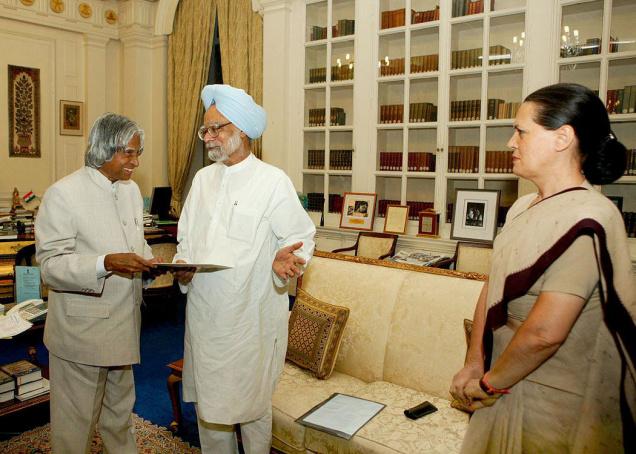Kalam was ready to make Sonia PM
President Abdul Kalam raised no objection to Sonia Gandhi becoming Prime Minister in 2004. Instead, he had been prepared to swear her in despite intense pressure from various parties and politicians, as that was the only “Constitutionally tenable” option available to him if the Congress chief had staked her claim.
Mr. Kalam says this in his forthcoming memoir, Turning Points, thus lifting the veil on an episode that has been wildly speculated upon, with right-wing sections till today convinced that he had dissuaded the Italian-born Ms. Gandhi from considering the prime ministership. In the book, the former President reveals that his office had readied a letter inviting Ms. Gandhi to form the government as Prime Minister but that she surprised him by nominating Manmohan Singh in her place: “This was definitely a surprise to me and the Rashtrapati Bhavan Secretariat had to rework the letter appointing Dr. Manmohan Singh as the Prime Minister.”
The former President says he was inundated with “emails and letters from individuals, organisations and parties” asking him not to accept Ms. Gandhi’s prime ministerial claim, all of which he passed on to “various agencies in the government for their information without making any remarks.” Visiting political leaders added to the pressure. But these demands were “constitutionally untenable”, and if Ms. Gandhi “had made any claim for herself, I would have had no option but to appoint her.”
In the same chapter, Mr. Kalam discloses that he wrote out his resignation in the wake of the Supreme Court judgment holding unconstitutional the May 23, 2005 midnight dissolution of the Bihar Assembly. He says he dropped the move after the Prime Minister pleaded with him not to resign as the resulting furore might lead to the fall of the government. The President was away in Moscow when Dr. Singh called him twice and conveyed the Union Cabinet’s decision to dissolve the Assembly based on reports from the State Governor. Mr. Kalam writes that he quizzed the Prime Minister on the urgency to dissolve an Assembly that had been in suspended animation for six months but nonetheless signed the midnight proclamation because he was convinced the government had made up its mind. However, despite his explicit request, he felt the government did not properly present the President’s action in court, leading to adverse judicial remarks on the Cabinet, which is “mine and I have to take the responsibility.”
soorce by thehindu












